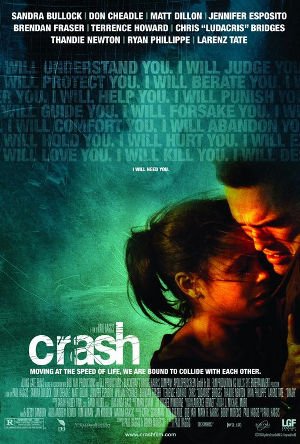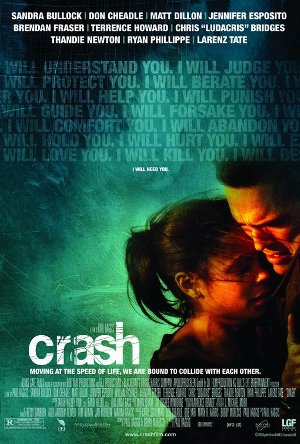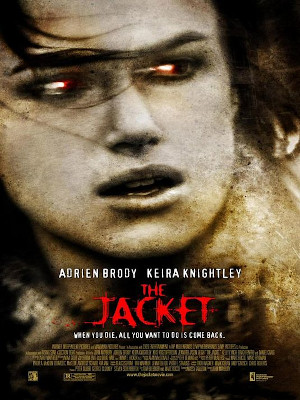D’s House
I’m normally distrusting of coming of age films, as they almost universally miss the mark on conveying the inner changes of lives in progress. Add Robin Williams playing a retarded man to a project written and directed by a former television actor and my cynic meter almost redlines. Thankfully David Duchovny pulls it off and lets me leave the theater with a pleasant smile on my face.
House of D
3 & 1/2 Stars
I’m normally distrusting of coming of age films, as they almost universally miss the mark on conveying the inner changes of lives in progress. Add Robin Williams playing a retarded man to a project written and directed by a former television actor and my cynic meter almost redlines. Thankfully David Duchovny pulls it off and lets me leave the theater with a pleasant smile on my face.
 |
| House of D |
According to the world of cinema, our lives are defined by a single event which serves both as a landmark and an easy explanation for the rest of our lives. In the real world however, our lives are redefined each and every day with every moment and action helping us become more and more ourselves. There are powerful moments with long-lasting effects, but without a director’s hand or screenwriter’s plot, each life is a compilation of endless series of moments. But that would make for some seriously long-ass movies, wouldn’t it? So we’ll have to settle for the snapshots of life provided by our current technology, I suppose.
Effectively casting off the remaining shreds of his iconic X-Files career, David Duchovny makes his writing and directing debut with House of D, a not-really-autobiographical coming of age film set in the early 70’s Greenwich Village. Duchovny plays Tommy, an artist living in Paris who tells his estranged wife and 13 year old son the story his own 13th year to explain the man he’s become. Anton Yelchin plays his 13 year old self, a prep-school student who lives with his widowed mother (Tea Leoni), pals around with his retarded friend Pappass (Robin Williams), and is looking for any guidance he can get to weather through those uncertain and confusing preteen years. His home life and his best friend force him to play an adult role he’s wholly unprepared for, but Tommy’s exuberance and humor allow him to remain the child he still is. With no stable adults in his life to turn to he’s in the dark as to how to win the affections of schoolmate Melissa (Robin Williams’ daughter Zelda, making her film debut), so he turns to the advice of “Lady” (Erykah Badu) a Women’s House of Detention inmate he’s never seen only heard. As every adult knows, the best intentions of our youth often make for disastrous consequences, and Tommy is forced to learn this lesson in a horrific series of events.
On the surface House of D may seem unfulfilling, as young Tommy’s life is nearly idyllic with the wide open streets of the Village before him, a delivery boy job that is low stress, easy money, and great fringe benefits, and a beautiful young girl who wants his attentions. But his grace filled path to adult provides friction with his friendship with Pappass, who’s just smart enough to know that he doesn’t get to grow up with his friend. Tommy’s mother is a shattered, chain smoking husk of a woman who wants to be a mother, but relies on her young son to take care of her. Eventually Tommy is forced to make a choice that erases every shred of his carefree life, and that is what’s kept the grown-up Tommy from being a fully complete human being.
Though the film does wander into some treacle-covered moments (particularly in the finale), the performance of Anton Yelchin is what makes this movie so enjoyable. I’m convinced that somewhere outside of Hollywood there is a lab dedicated to the creation of each generation’s Henry Thomas (E.T.). The last one churned out was the talented and quirky Jeremy Davies, but I truly hope Yelchin’s career has more staying power than that. His easygoing charm and good-natured humor sucks you in, and makes you want Tommy to have the life he deserves. There’s no awkwardness or stiffness in his delivery and body-language, and he holds his own alongside Frank Langella, Leoni, and a thankfully restrained Williams.
Robin Williams playing a retarded adult was the thing that made me the most trepidatious about House of D, but outside of playing the character just a tad more intelligent and knowing than is probably accurate, his performance works well. He never overshadows his young co-star, and his asides and mannerisms help keep an already funny film more lighthearted. It’s about time Robin Williams found a dramatic role that didn’t require him to maintain a pained grimace from start to finish.
Tea Leoni has just a few snippets of screen time, but her almost trademark neurosis works incredibly well in her scenes. It’s always painful to watch parents reduced to relying on their young offspring, and her performance maintains the right balance of pathos and sympathy. Sure she’s a selfish wreck, but she obviously loves her child. It’s just that she doesn’t know how to be there for him like Tommy is for her.
Zelda Williams isn’t given much screen time either, but her Melissa feels natural and unaffected. It’ll be interesting to see where she goes from here. And Frank Langella? Well he’s as solid as ever. HBO’s “Unscripted” has him perfectly cast as the jaded mentor to a group of young actors, as he just exudes authority and confidence with every laconic line that leaves his lips. His stern Catholic headmaster works because for all his gruff and seeming disinterest, he’s genuinely concerned for his charges and just as genuinely disappointed when they fail.
Duchovny has gone on record as stating that his intent was to make a fable as well as a film, and in that regard he’s succeeded. Everything is just a little bit more than might be found in everyday life, but only so much as the story requires. As I stated before, the ending loses a little of its impact, as things wrap up a little too perfectly, but what fable doesn’t? Overall I’m reminded of Peter Weir’s excellent autobiographical film “The Year My Voice Broke” which might serve as the more realistic and downbeat cousin to House of D. Both films have a deep and lasting sadness to them, but what life doesn’t? The heartbreak and loss we suffer define us as much as our accomplishments and House of D does a beautiful job of balancing the humor, the hurt, and the general imbalance of those in-between years.
If nothing else, go see this film for Anton Yelchin. If Hollywood knows what’s good for it, this should be the first of a long series of great performances from a young actor with just oodles of potential.

 Racism is a difficult subject to broach cinematically. It’s all too easy to reduce it’s complexities and ignore the underlying reasons for racial tensions all together. Pithy moments of clarity and harsh realizations may make for good viewing, but they hardly touch on the lasting and deep seated effects of our prejudices. Paul Haggis (screenwriter of Million Dollar Baby) makes his directorial debut with Crash, a sprawling look at the seemingly endless well of racism in L.A., but for all its multiple storylines and enlightened moments all that’s left in the end is the idea that deep down we’re all just fundamentally damaged beyond repair, just simmering until that one moment brings our inner racist to the forefront.
Racism is a difficult subject to broach cinematically. It’s all too easy to reduce it’s complexities and ignore the underlying reasons for racial tensions all together. Pithy moments of clarity and harsh realizations may make for good viewing, but they hardly touch on the lasting and deep seated effects of our prejudices. Paul Haggis (screenwriter of Million Dollar Baby) makes his directorial debut with Crash, a sprawling look at the seemingly endless well of racism in L.A., but for all its multiple storylines and enlightened moments all that’s left in the end is the idea that deep down we’re all just fundamentally damaged beyond repair, just simmering until that one moment brings our inner racist to the forefront.

 Intertwining tales of violence and bubbling racial tensions crash into each other as residents of L.A. deal with issues of hate, bigotry, and racism that present themselves sometimes subtly and sometimes not-so-subtly throughout the course of the film. Crash tries to show how many people live their lives with certain ideas and notions that they might not even be aware of until they are forced to confront them. Many people won’t like the film for it’s bleak look at the human condition, but in examining this small group of people the film works for me as it shows how easily ill-will and prejudice can be passed on from one person to the next through angry or hateful exchanges.
Intertwining tales of violence and bubbling racial tensions crash into each other as residents of L.A. deal with issues of hate, bigotry, and racism that present themselves sometimes subtly and sometimes not-so-subtly throughout the course of the film. Crash tries to show how many people live their lives with certain ideas and notions that they might not even be aware of until they are forced to confront them. Many people won’t like the film for it’s bleak look at the human condition, but in examining this small group of people the film works for me as it shows how easily ill-will and prejudice can be passed on from one person to the next through angry or hateful exchanges.
